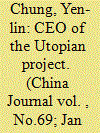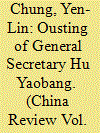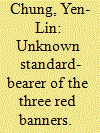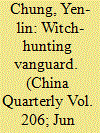| Srl | Item |
| 1 |
ID:
119715


|
|
|
| 2 |
ID:
163451


|
|
|
|
|
| Summary/Abstract |
With the support of Party elders led by Deng Xiaoping, Hu Yaobang
assumed the top position in the Chinese Communist Party (CCP). �is
article examines the roles played by the powerful “revolutionary elders”
in Hu’s dismissal from the post of CCP General Secretary in early
1987. Special attention is paid to the role of Peng Zhen. �is detailed
study furthers our understanding of the nature and operations of
Chinese elite politics in the Deng era, and of the complex generational
relations between the old revolutionaries and the successor generation
of leaders.
Deng Xiaoping (鄧小平), Chen Yun (陳雲), Peng Zhen (彭真), and others
among the post-Mao Party elders had been in�uential statesmen in the
People’s Republic of China (PRC) during the pre–Cultural Revolution
|
|
|
|
|
|
|
|
|
|
|
|
|
|
|
|
| 3 |
ID:
139858


|
|
|
|
|
| Summary/Abstract |
As a senior member of the Chinese Communist Party Politburo, second-in-command of the Central Secretariat and Party secretary of Beijing Municipality, Peng Zhen was trusted by Mao Zedong and exerted power and influence over Chinese politics during the period before the Cultural Revolution. However, the significance of his role in the Great Leap Forward has been underestimated and misunderstood. This article investigates Peng’s active leadership in major policies, including the mass steel-making campaign, the Anti-Right-Opportunist campaign and the people’s commune movement. Through examination of Peng Zhen’s role, this article endeavors to provide new insights into leadership politics at the time.
|
|
|
|
|
|
|
|
|
|
|
|
|
|
|
|
| 4 |
ID:
105858


|
|
|
|
|
| Publication |
2011.
|
| Summary/Abstract |
When the king went astray, the people suffered for it. Just as a wayward king needed loyal and capable courtiers to implement his wishes, so too did Mao Zedong in the People's Republic of China. The Anti-Rightist Campaign was one of Mao's controversial policies, and involved him delegating his trusted followers to implement his political initiatives. This article examines how the Central Secretariat, led by Deng Xiaoping, effectively implemented and strictly supervised the process, as well as the negative influences of the Central Secretariat on this witch-hunt-like campaign. It thus provides a case study of how the Central Secretariat operated and functioned as a powerful political apparatus in the political processes of the Chinese Communist Party during the pre-Cultural Revolution period.
|
|
|
|
|
|
|
|
|
|
|
|
|
|
|
|